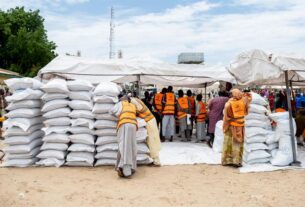As we move into our first maskless Christmas and New Year since the end of 2019, in this second and last part of this series, we look at the surprising winners and changes in East Africa during the pandemic.
Covid-19 lockdowns were particularly hard on undertakings where many people gather or have close contact: Schools, sports, clubbing, African weddings, and Sunday mass, to name a few.
It was, therefore, surprising that the first signs of hope out of the pandemic prison came via sports. In May 2021, Basketball League Africa’s launch tournament took place in Kigali, Rwanda. Postponed in 2020 as Covid rampaged and there was no vaccine in sight, the league had planned to play in six venues in six countries. The 2021 Kigali inaugural was held in a secure bubble. Even drinks weren’t allowed into the Kigali Arena, because people would have had to take their masks off for short periods to take swigs.
It was the first live-televised continental Covid-era event. The unsaid message that it was possible to beat the virus and return to normalcy was more worthwhile than the games. Kigali BAL was a birth – the launch of the league.
Safari Rally rebirth
In Kenya, there was a rebirth. In June 2021, the World Rally Championship (WRC) Safari Rally returned after 19 years of exile. Coming back in lockdown conditions was reaffirming at a time when the air was full of accusations about the west hoarding Covid vaccines and “letting Africans die” – which, defiantly, they didn’t.
Even more powerfully, the 2021 World Athletics U20 Championships were hosted in Nairobi from August 18 to 22.
There is an old, overused saying that sports unites. In these cases, they were candles in the dark. Many people saw that as representing something more significant than sports. It wasn’t a surprise, then, that when BAL returned to Kigali this year, and the WRC Safari Rally to Kenya too, there were quite a few East Africans who went to watch like they were making a pilgrimage to Mecca.
Like in several other places, in East Africa, the pandemic led to a dramatic securitisation of health, as police swarmed streets, brutalising people as they enforced curfews and wearing of masks.
To impose Covid blockades, many governments vacated all other areas because they didn’t have the resources to occupy all contested spaces or were too corrupt and, therefore, concentrated on stealing the money and supplies that poured in to fight the pandemic.
Tigray
On the edge of the East African Community, there is a view that Tigray read that Covid had preoccupied the federal government in Addis Ababa and left it unable to respond effectively to a military challenge.
It’s still hard to know whether that was one of the calculations of the Tigray rebels in November 2020, but they enjoyed the upper hand over Addis Ababa for the better part of the following year.
They were then impaled on the same logic. With no vaccination in Tigray because of the war, the success of the Ethiopian government in mobilising war resources during the pandemic, and a drought that came when the movement of people was already restricted, Addis Ababa recovered and ruthlessly put Tigray to the sword. It was Eastern Africa’s first pandemic war.
Elsewhere, now both governments and rebels know what to do and what not to do when the next pandemic comes.
Steaming chambers
In Tanzania, after a few weeks of Covid testing, the authoritarian and volatile president John Magufuli declared that it was all nonsense. Covid wasn’t a thing. There would be no more testing, and most control and social distancing protocols would be ditched. Arguing that Covid was just stubborn flu, Magufuli prescribed prayer and inhaled steam as a coronavirus treatment. And off, thousands of Tanzanians headed to steaming chambers.
The world waited for unvaccinated and unmasked Tanzanians to die in their millions. There were reports, and social media posts, claiming many deaths and mass graves.
There were deaths alright, but so far, nothing indicates that they were much higher in Tanzania than in several of the large nations on the continent that were heavily vaccinated (like South Africa) and sanitised.
Official denials
Magufuli’s Tanzania became the first country in the region, which was an otherwise relatively open society, to bury a virus on the scale of Covid-19 under official denials and swift punishment of those who dared do anything to show it exists. It taught us how fragile the hold of science could be in public health policy. And it demonstrated that it was possible to get away with it at a state level, although Magufuli himself seemed to have succumbed to Covid in March 2021.
Nearly three years later, it remains a mystery what happened in Tanzania between March 2020 and March 2021. Even the Americans, who have a long history of industrial-scale psychological operations (PSYOP), couldn’t keep the cover on their 2002 lie that Iraq dictator Saddam Hussein had large stockpiles of “weapons of mass destruction” for that long.
It would seem that from beyond his grave, Magufuli is able to keep a lid on Tanzania’s Covid story.
Charles Onyango-Obbo is a journalist, writer, and curator of the “Wall of Great Africans”. [email protected]



